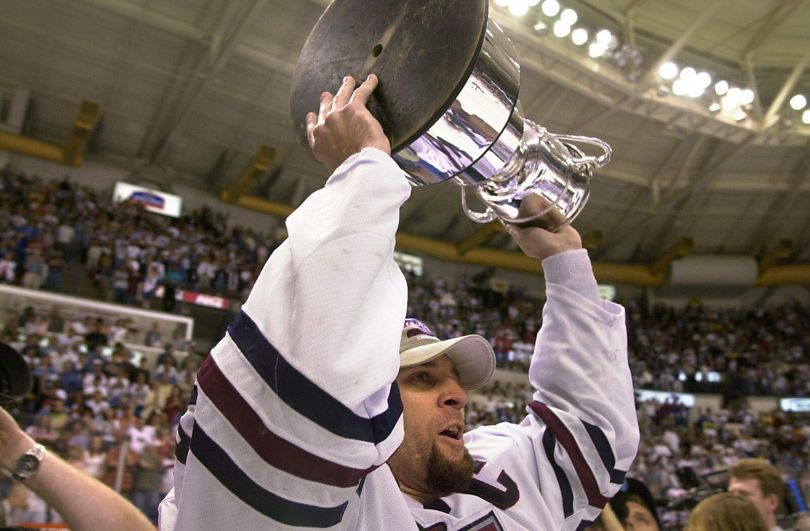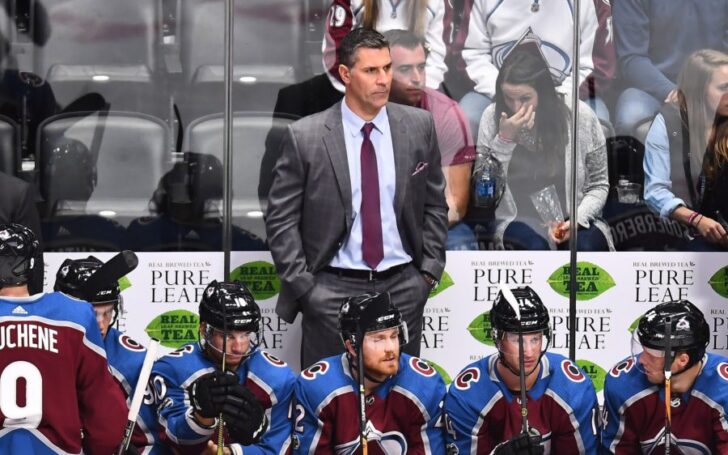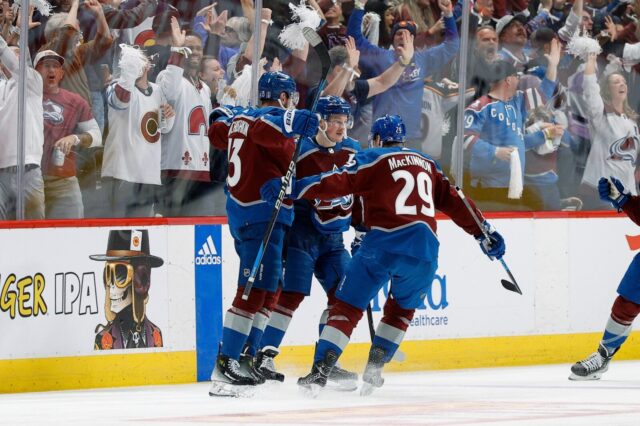During a 4-2 break out of the gate in 2017-18, the Avalanche already has accomplished something it couldn’t pull off all of last season — winning three games in a row.
There still are the whispers, of course.
Remember, the Avs were 3-1 after four games in the dreadful season. They were 9-9-0 in late November.
A year ago at this stage, we thought this was a decent team, perhaps capable of — in the words of noted hockey fan Emeril Lagasse — kicking it up a notch and squeezing into the playoff field.
And then look what happened.
Well, even after the Avalanche’s 3-1 loss at Dallas Saturday, and heading into Tuesday night’s game at Nashville, it still is rational to argue — in guarded tones — that this team is showing signs of major improvement in its second season under Jared Bednar. The “younger” and “faster” reboot shows promise.
Considering Colorado might need to double its 48 points of last season to make the playoffs, the postseason is a Leicester City longshot, but this is to the point where progress, hope and an increased entertainment quotient will go a long way in this marketplace…and beyond.
And, yes, at least when considered against the backdrop of hockey’s no-patience, scapegoat-the-coach culture, it’s a bit surprising that Bednar still is behind the Colorado bench.
It’s also only fair.
“I’ve said it before, it’s a different group,” Bednar said after the win over Anaheim Friday. “It’s different players, it’s different leadership, it’s different coaches. We’re thinking about this year. I’m happy with what we’re seeing, but the work’s just begun. Our guys know that. We have something to prove. Respect is going to be earned every day and it’s going to take the whole season and then some to earn it back.”
Bednar’s first season, as it turned out, came with what Avalanche general manager Joe Sakic considered a built-in excuse: The bizarre circumstances of Bednar’s hire in late August, two weeks after Patrick Roy issued a statement to Canadian media outlets through a Quebec City public relations agency to announce his resignation and also prevent the team, which was taken by surprise, from putting its spin on it first.
The relationships had become that fractured, with Roy angered by what he perceived to be his lack (or at least lessening) of influence in personnel decisions and the transformation of his vice president title from significant to meaningless as others had Sakic’s ear.
In a league that has frequently makes in-season changes, with new coaches making immediate impact, and with systems somewhat easily alterable or quickly overhauled (this isn’t an NFL playbook), the degree of damage caused by the weird timing was debatable. Yet it at least contributed to a strange, unsettled atmosphere as the Avalanche went into the regular season a year ago. The “woe-is-us, what-next?” feeling — a feeling that Bednar probably could have done a better job of combating — was at least partially responsible for the free-fall.
As the season unfolded, turning into the 48-point disaster, I repeatedly asked Sakic variations of the lame and unimaginative, but also necessary, questions about Bednar’s job security, both at the time and for the upcoming 2017-18 season.
It almost turned into a friendly running joke, with Sakic prefacing his remarks with something along the lines of, “The answer is the same as last time you asked … and it isn’t going to change.”
Hockey, and indeed all major-league sports, has a history of issuing those sorts of (dreaded) votes of confidence right up to approximately 18 seconds before a coaching change is announced, with the GM’s disclaimer: “I meant what I said when I said it. Things changed.”
So although I also believed Bednar should get at least a second season, and found Sakic’s refusal to give in to the blame-the-coach convention to be refreshing, I kept asking.
Bednar calmly handled periodic questions about his security, saying he was operating as if and assuming he would be back, but hadn’t been explicitly assured of that. He was working under a three-year contract, so there was that financial safety net regardless of what happened, the Kroenke ownership likely wouldn’t be thrilled with paying both him and a replacement coach. Plus, firing him would have been perceived as Sakic admitting he made a mistake in the hiring after relatively modest financial parameters in the Avalanche’s coaching search came into play.

Jared Bednar as captain of the ECHL’s South Carolina Stingrays, holding aloft the Patrick J. Kelly Cup. Ironically, the Cup — which the Colorado Eagles also won earlier this year — is named after a one-time coach of the NHL’s Colorado Rockies. (Photo courtesy South Carolina Stingrays.)
Moreover, Bednar’s hiring was a heartening underdog story, one I enjoyed telling in an extensive newspaper profile. The son of a nomadic, Saskatchewan-based Royal Canadian Mounted Police officer, Bednar was a minor-league journeyman player who then worked his way up through the ranks as an assistant and successful head coach in, first, the ECHL and then the AHL. Frankly, those kinds of stories intrigue me, and I think many feel the same way and in that sense were pulling for him last season. (I’ll confess it. I was.)
Sakic was upfront, eventually acknowledging that last year’s roster was a perfect storm of considerable dead weight and a few horrible contracts that were a drag on a team near the NHL salary cap despite a horrible record. The Avalanche, he said, needed to get younger and faster and that Bednar deserved a chance to coach that overhauled team.
So Bednar not only made it through the season, he is back for another shot.
Three of the holdover assistant coaches from Roy’s staff — Dave Farrish, Tim Army and goaltending coach Francois Allaire — aren’t back, and the additions are veteran assistant Ray Bennett and goaltending coach Jussi Parkkila, who worked with Semyon Varlamov in the KHL before Varlamov came to North America. Nolan Pratt, who joined Roy’s staff in the summer of 2016 after working with Bednar at Springfield and Columbus in the AHL, and video coach Brett Heimlich also return.
The Avs weren’t just bad last season. They were historically horrific. That’s not a good starting point.
So in many ways, the measure of Bednar’s effectiveness is whether he can leave us with the impression that he is in control, that he can nurture the young talent that came in either late last season or in the offseason, and that’s especially challenging because “young” is not necessarily a guarantee that all of these guys are difference-makers. He also must deal with the awkward Matt Duchene situation, and so far it seems that his tactic — after one training-camp conversation — is to leave it alone, not push it, and assume that on the ice, Duchene’s pride and professionalism will kick in. (And so far, that seems to be the case.)
Sakic’s role as the head of the hockey operation will be subject to similar standards, and a lack of improvement likely would lead to him being nudged into a more ceremonial emeritus role in a front office of massaged titles and new blood. In that sense, his and Bednar’s fates are more intertwined than they were before in the first post-Roy season.
* * *
Denver-based journalist Terry Frei writes commentaries about the Avalanche for Mile High Sports. He has been named a state’s sports writer of the year seven times, four times in Colorado (including for 2016) and three times in Oregon. He’s the author of seven books, including the fact-based novel “Olympic Affair” about Colorado’s Glenn Morris, the 1936 Olympic decathlon champion; and “Third Down and a War to Go,” about the 1942 football national champion Wisconsin Badgers and the players’ subsequent World War II heroism. His web site is terryfrei.com and his additional “On the Colorado Scene” commentaries are at terryfrei/oncolorado



